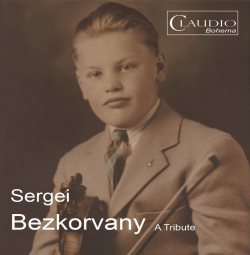| 
|
Sergei Bezkorvany - A Tribute
Joaquín TURINA (1882-1949)
Violin sonata No.1 Op.51 (1929) [12:42]
Bohuslav MARTINŮ (1890-1959)
Five Madrigal Stanzas for violin and piano (1943) [11:59]
Karol SZYMANOWSKI (1882-1937)
Violin Sonata in D minor Op. 9 (1904) [24:21]
Edward ELGAR (1857-1934)
Violin Sonata in E minor Op.82 (1918) [27:14]
Sergei Bezkorvany (violin)
Michael Reeves (piano)
Julian Dawson (piano): Szymanowski, Elgar
rec. 1974, ORF Vienna radio (Elgar, Szymanowski) and 1977, Radio-Television, Suisse Romande (Martinů, Turina)
CLAUDIO BOHEMA CB5997-2 [75:02]
Sergei Bezkorvany (1930-2010) was born in Toronto of a Ukrainian family. He grew up in Winnipeg where he studied the violin, later enrolling at Juilliard. There he had two eminent teachers – Joseph Fuchs and, for chamber music, Louis Persinger, whose raft of pupils included Menuhin and Ricci. He worked as an orchestral player in his native country before coming to England in 1953 to play in the orchestra of Sadler’s Wells Opera and Ballet, then pursuing similar positions in North America – as varied as Halifax, New Orleans – before re-crossing the Atlantic to play in the London Philharmonic and Philharmonia. He eventually became leader of the BBC Scottish Orchestra. I have only previously encountered him on disc playing the sonatas of Joseph Gibbs [Claudio CR3606/7-2] but now this tribute volume has been released by the same label in far more standard repertoire.
The music derives from radio broadcasts given in Vienna in 1974 – Elgar and Szymanowski – and for Suisse Romande in 1977; the Turina and Martinů. He and Julian Dawson take a quite big-boned approach to the Elgar, and are emphatic and a little awkward in places. Apart from the timid pizzicati at the start of the slow movement - which could be a microphone placement problem - the first two movements work pretty well, some intonation concerns aside. There’s some succulent old school phrasing and Bezkorvany grades the motion to the central movement’s climax well. The real problem is the finale, taken at a ruinously slow pulse, which comes to a full stop in the paragraph that recalls the Romance movement. They seem better attuned to the Szymanowski Sonata, at least with regard to questions of rubato. They maintain their robust attitude, and it’s noticeable that their slow movement is slower than one often encounters and somewhat discursive and over-rhapsodic. Piotr Pławner on Dux is one of those violinists who seem to me to take a more effective, faster tempo here.
The Swiss broadcast includes the Turina Op.51 Sonata, which doesn’t offer nearly so much room for latitude as the Szymanowski or Elgar. Here his piano partner is Michael Reeves. Bezkorvany was certainly not the most silken of tonalists, but he enjoys the more rugged energy of the Rondeau finale. It’s always good to hear Martinů’s Five Madrigal Stanzas, a highlight of which here is the deftly bowed central Andante. Some of his best playing comes here.
This is certainly an artist-led disc, and it has affectionately compiled and documented.
Jonathan Woolf
 |
 |
|



 All Nimbus reviews
All Nimbus reviews








